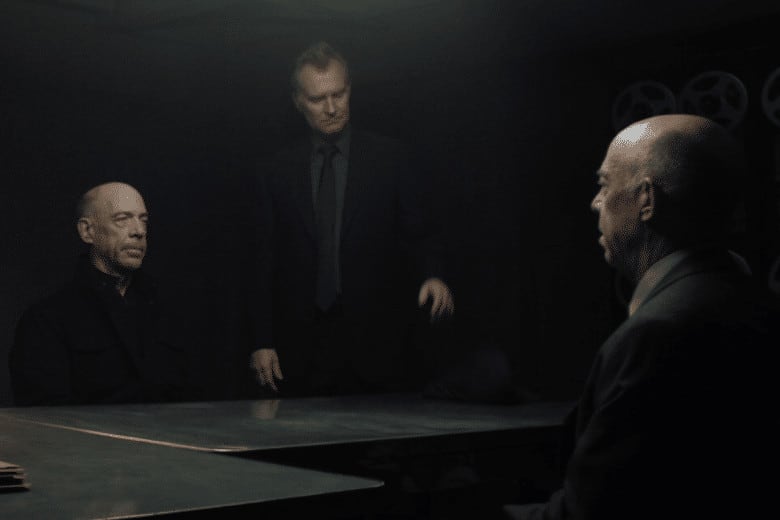
Dark, fun, spy stuff awaits in both dimensions.
Doppelgangers. Both a spooky word and doubly spooky to come across, they’re a whole lotta fun in Counterpart, a dark espionage series that airs on Starz and features beloved sideman J.K. Simmons in not only the first starring role in his long career in television but two of them. He’s both a dumpy bureaucrat named Howard Silk who dotingly reads Rilke to his bedridden wife and Howard Silk, a take-no-names badass who abandoned his wife and family to do spy stuff and shoot people and be in charge. The contrivance is the idea of Justin Marks, a newcomer to the world of dramatic television, most well-known for writing Jon Favreau’s live action take on The Jungle Book in 2016. Marks imagines a world that was cracked in two dimensions thirty years ago and had been going their own separate ways ever since. The differences between these two worlds are small and large; in the alternate world, for instance, Prince is still alive. Delegates from the two worlds meet at long tables and trade secrets.
The show’s visual reliance on muted grays and noir-ish shadows evoke the mood of those Cold War signifiers and the series’ setting of Berlin, where the passageway between dimensions is apparently located, doubles down on this. Half of the city still looks like it is part of another country, because at one point it was, and the show’s stable of directors, which include likeminded dark espionage vets like Morten Tyldum (The Imitation Game) and Alik Sakharov (The Americans, House of Cards) relish in this convenience. The meek Simmons of our universe is employed in a thankless cavern deep in a sea of cold Brazil-esque insipidity. The other dimension is the bleaker of the two and East Berlin’s Stalinist concrete canyons fill in as signifiers of something lost. Both dimensions of Counterpart, however, fittingly feel stuck in time, typewriters find occasional use and cellphones appear absent, fitting for the set-up of a perpetual inter-dimensional conflict.
Fortunately, Marks, who also scripted the first two episodes, gets things going early on and we’re treated to the two Mr. Silks in the same room cattily arguing with each other by the end of the first episode. It’s rather like if Simmons’ fist-pounding Terence Fletcher from Whiplash was aiming his pent-up rage at, say, the dopey father in Juno rather than poor Miles Teller. Which is a really funny image, so thank you. To tell the two Simmons apart, the Mr. Silk from the other dimension is dressed in all black, meant to signify that he is clearly the evil twin, or at any rate the insidious one. But is he? The two eventually switch places, learn things.
Deeper questions persist. The one that underlines the premise is the most interesting and will bring flashbacks to Pysch 101 questions of nature or nurture. From afar, we spot an assassin-turned-terrorist (Sara Serraiocco) longingly watch her other find success as an orchestral violinist. The Silk from our universe tries very hard to patch it up with the non-hospital bound version of his wife (Olivia Williams) neglected in the universe over the hill. Scenes between the two Silks are both the most visually entertaining and the most emotionally charged, as each version of Simmons’ character attempts to parse what about themselves is unique and what was set in the concrete of their skin. It gives Simmons, who is also listed as a producer on the show, the ultimate acting exercise but also probes meaningfully into what we consider our own.
The identity subterfuge provides Simmons with killer lines like “Stop trying to make me in your image,” which reminded me of that fantastic Linkin Park song and joyous thesis statements like: “Do you really think you’re that different? Do you think I can’t look at you and know everything about him? Or look at him and know everything about you?,” delivered to Simmons by one of his handlers. In moments like these, Counterpart almost feels novelistic, clammily ruminating on a theme in the style of a Charlie Kaufman production from a decade and a half ago.
Eventually the show flattens into a something of a conventional Cold War espionage noir, with subterfuge being smuggled across (dimensional) borders. Harry Lloyd shows up and reprises his Game of Thrones role of an ineffective political sycophant. While empathy demands we picture our enemies on the other side (of whatever, its a juicy metaphor) as normal people just like us, Counterpart takes it a delicious step further. A mysterious terrorist organization wants to blow things up and there’s a mole in the ministry who need to be flushed out. That wife also has a dark, espionage-y secret that you’ll want revealed before the first season, of two Starz has commissioned from Marks, is up. This is dark, fun stuff.
Related Topics: J.K. Simmons, Starz
